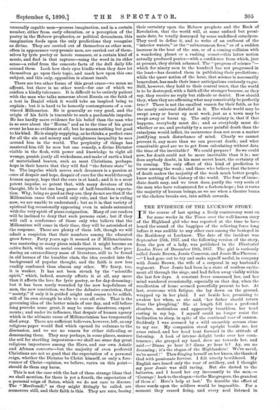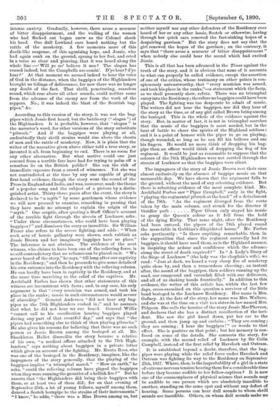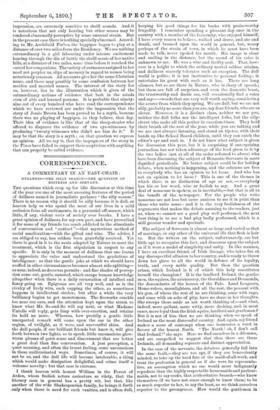THE EVIDENCE OF THE LUCKNOW STORY.
IN the course of last spring a lively controversy went on for some weeks in the Times over the well-known story of the Highland girl who was reported at the time to have heard the sound of the bagpipes of the relieving force long before it was audible to any other ears among the besieged in the Residency at Lucknow. The date of the incident was September 25th, 1857, and the following version of the story, from the pen of a lady, was published in the Illustrated London. News of December 19th, 1857. The girl is variously called Jessie Brown, Jessie Cameron, and Jessie MacPherson : —" I had gone out to try and make myself useful, in company with Jessie Brown, the wife of a corporal in my husband's regiment. Poor Jessie had been in a state of restless excite- ment all through the siege, and had fallen away visibly within the last few days. A constant fever consumed her, and her mind wandered occasionally, especially on that day, when the recollection of home seemed powerfully present to her. At last, overcome with fatigue, she lay down on the ground, wrapped up in her plaid. I sat beside her, promising to awaken her when, as she said, ' her father should return from the ploughing.' She at length fell into a profound slumber, motionless and apparently breathless, her head resting in my lap. I myself could no longer resist the inclination to sleep, in spite of the continual roar of cannon. Suddenly I was aroused by a wild unearthly scream close to my ear. My companion stood upright beside me, her arms raised, and her bead bent forward in the attitude of listening. A look of intense delight broke over her coun- tenance; she grasped my hand, drew me towards her, and said :—' Dinna ye hear it ? dinna ye hear it? Ay, am no dreaming ; it's the slogan of the Highlanders ! We're saved, we're saved ! ' Then flinging herself on her knees, she thanked God with passionate fervour. I felt utterly bewildered. My English ears heard only the roar of artillery, and I thought my poor Jessie was still raving. But she darted to the batteries, and I heard her cry incessantly to the men:— 'Courage! hark to the slogan—to the Macgregors, the grandest of them a'. Here's help at last.' To describe the effect of those words upon the soldiers would be impossible. For a, moment they ceased firing, and every soul listened in intense anxiety. Gradually, however, there arose a murmur of bitter disappointment, and the *wailing of the women who had flocked out began anew as the • Colonel shook his head. Our dull Lowland ears heard nothing but the rattle of the musketry. A few moments more of this death-like suspense, of this agonising hope, and Jessie, who had again sunk on the ground, sprang to her feet, and cried in a voice so clear and piercing, that it was heard along the
whole line Will ye no' believe it noo P The slogan has ceased indeed, but the Campbells are comin'. D'ye hear P d'ye bear?' At that moment we seemed indeed to hear the voice of God in the distance, when the bagpipes of the Highlanders brought us tidings of deliverance; for now there was no longer any doubt of the fact. That shrill, penetrating, ceaseless sound, which rose above all other sounds, could neither come from the advance of the enemy nor from the work of the sappers. No ; it was indeed the blast of the Scottish bag- pipes," &c.
According to this version of the story, it was not the bag- pipes which Jessie first heard, but the battle-cry (" slogan ") of the Highlanders. It is probable, however, that " slogan " is the narrator's word, for other versions of the story substitute " pibroch." And if the bagpipes were playing at all, undoubtedly their shrill strains would rise above the shouts of men and the rattle of musketry. Now, it is plain that the writer of the narrative given above either told a true story, or invented it all, from beginning to end. There is no room for any other alternative. But what motive could one just rescued from a terrible fate have had for trying to palm off a senseless lie on the British public P She ran the risk of immediate exposure from a crowd of witnesses. Yet she was not contradicted at the time by any one capable of giving first-hand evidence, though the story went the round of the Press in England and India, and was, moreover, made the theme of a popular song and the subject of a picture by a distin- guished artist. Thirty-three years after the event, the story is declared to be "a myth" by some gentlemen whose evidence we will now proceed to examine, remarking in passing that they have made no attempt to explain the origin of the "myth." One sceptic, after quoting a Staff Officer's account of the terrible fight through the streets of Lucknow, asks : " Under these circumstances, who could have been playing bagpipes ?" and dismisses the story as incredible. Sir William Fraser also refers to the severe fighting, and adds : " When such acts of heroic gallantry were shown, such rubbish as Jessie Brown and her imaginary bagpipes have no place." The inference is not obvious. The evidence of the next witness, who claims to have been one of the relieving force, is so self-contradictory that no reliance can be placed on it. " We never heard of the story," he says, " till long after our captivity in the Residency;" and then he proceeds to give some details of his own entrance into the Residency with the relieving column. He can hardly have been in captivity in the Residency, and at the same time marching to the relief of the captives. Mr. Archibald Forbes has shown that other statements of this witness are inconsistent with facts ; and, in any case, his only argument is that " every musician was armed, and took his place in the ranks ; music in such circumstances would savour of absurdity." General Anderson "did not hear any bag- pipes as the 78th Highlanders rushed in ;" and he assumes that what he did not hear no one heard. General Willis " cannot call to his recollection hearing bagpipes played during any part of that eventful day," and says that " the pipers had something else to think of than playing pibrochs." He also gives his reasons for believing that there was no such person as Jessie Brown among the besieged at all. Mr. Shackleton Hallet discredits the story because a relative of his own, "a medical officer attached to the 78th High- landers," says nothing about bagpipes in a private letter which gives an account of the fighting. Mr. Ruutz Rees, who was one of the besieged in the Residency, imagines, like the impugners of the story generally, that the playing of the bagpipes implies "a triumphal march." "How on earth," he asks, " could the relieving column have played the bagpipes when they were running the gauntlet of a hellish fire P" But he asserts that " the Highlanders did bring their bagpipes with them, or at least two of them did ; for on that evening of September 25th, a lot of young fellows, myself among them, danced a Scotch hornpipe to the strains of their instruments." "I know," he adds, "there was a Miss Brown among us, but neither myself nor any other defenders of the Residency ever heard of her or any other lassie, Scotch or otherwise, having through her quick ears renewed the fast-sinking hopes of a despairing garrison." But the story does not say that the girl renewed the hopes of the garrison ; on the contrary, it says that "there arose a murmur of bitter disappointment" when nobody else could hear the sound which had excited Jessie.
This is all that has been advanced in the Times against the truth of the story, and it is obvious that none of it amounts to what can properly be called evidence, except the assertion of one of the critics, whose testimony on other points is con- spicuously untrustworthy, that " every musician was armed, and took his place in the ranks,"—a statement which the factis, as we shall presently show, refute. There was no triumphal entry into the Residency; therefore no bagpipes could have been played. The fighting was too desperate to admit of music. The writers did not hear the bagpipes, nor did they hear of the story at the time, or of any girl called Brown being among the besieged. This is the whole of the evidence against the story. But, in matter of fact, it is not in triumphal marches that the music of the bagpipes is most needed, but in the heat of battle to cheer the spirits of the Highland soldiers ; and it is a point of honour with the piper to go on playing, though wounded, so long as he can fill his bellows and use his fingers. He would no more think of dropping his bag- pipe than an officer would think of dropping the flag of his regiment. It would be just as reasonable to suppose that the colours of the 78th Highlanders were not carried through the streets of Lucknow as that the bagpipes were silent.
The impugners of the story of Jessie Brown rest their case almost exclusively on the absence of bagpipe music on that memorable day. We have shown that the argument falls to the ground, without the need of any rebutting evidence. But there is rebutting evidence of the most complete kind. Mr. Archibald Forbes saw " Piper Campbell," early in the fight, " playing the regimental pibroch at the head " of a detachment of the 78th. " As the regiment diverged from the route taken by the main column, and struck for the directer if bloodier path Piper Glenn only stayed his mnsie to grasp the Queen's colour as it fell from the hold of the dying Kirby. That same night, after the Residency had been entered, the pipers of the 78th played round the mess-table in Gubbins's dilapidated house." Mr. Forbes asks pertinently : ." Is there anything remarkable, then, in the supposition that since the regiment assuredly had its bagpipes, it should have used them, as is the Highland manner, in inspiring the ardour and confidence which the advance along the street of death required P" In " A Lady's Diary of the Siege of Lucknow" (the. lady was the chaplain's wife), we read : " Just at dark, we heard a very sharp fire of musketry quite close by, and then a tremendous cheering ; an instant after, the sound of the bagpipes, then soldiers running up the road, our compound and verandah filled with our deliverers, and all of us shaking hands frantically." In addition to this evidence, the writer of this article has, within the last few days, cross-examined on this question a survivor of the little band besieged in the Lucknow Residency. Her name is Mrs. Gafney. At the date of the story, her name was Mrs. Wallace, and she was at the time on a visit to a sister-in-law named Mrs. Pidgeon. She calls the heroine of the story Jessie MacPherson, and declares that she has a distinct recollection of the inci- dent. She saw the girl kneel down, put her ear to the ground, and then jump up and exclaim : " They are coming ; they are coming ; I hear the bagpipes !" or words to that effect. She is positive on that point ; but her memory is con- fused on some of the details. She connects the story, for example, with the second relief of Lucknow by Sir Colin Campbell, instead of the first relief by Havelock and Outram.
It is established beyond a doubt, therefore, that the bag- pipes were playing while the relief force under Havelock and Outram was fighting its way to the Residency on September 25th, 1857. Where, then, is the improbability of a girl in a state of extreme nervous tension hearing them for a considerable time before they became audible to her fellow-captives P It is now one of the commonplaces of physical science that sounds may be audible to one person which are absolutely inaudible to another, standing on the same spot and without any defect of hearing. Some persons can hear dull sounds to whom shrill sounds are inaudible. Others, on whom dull sounds make no impression, are extremely sensitive to shrill sounds. And it is notorious that not only hearing but other senses may be rendered abnormally perceptive by some unusual strain. But in the present case there is nothing specially abnormal. Accord- ing to Mr. Archibald Forbes, the bagpipes began to play at a distance of over two miles from the Residency. We see nothing extraordinary in a girl labouring under intense excitement hearing through the din of battle the shrill music of her native hills, at a distance of two miles, some time before it reached the earsof her companions. The variety of surnames assigned to her need not perplex us, slips of memory in regard to names being notoriously common. All accounts give her the same Christian name, and there may possibly be some confusion between her maiden and married names. The interest of the story for us, however, lies in the illustration which it gives of the extraordinary notions of evidence that lurk in the minds even of able and learned persons. It is probable that ninety- nine out of every hundred who have read the correspondence which we have reviewed are under the impression that the story of Jessie Brown has been proved to be a myth, because there was no playing of bagpipes, as they believe, that day. Their idea of evidence is like that of the sheep-stealer who offered to disprove the evidence of two eye-witnesses by producing "twenty witnesses who didn't see him do it." It may be that the story is a myth ; on that question we express no opinion. All we say is, that the impugners of the story in the Times have failed to support their scepticism with anything that can properly be called evidence.




































 Previous page
Previous page